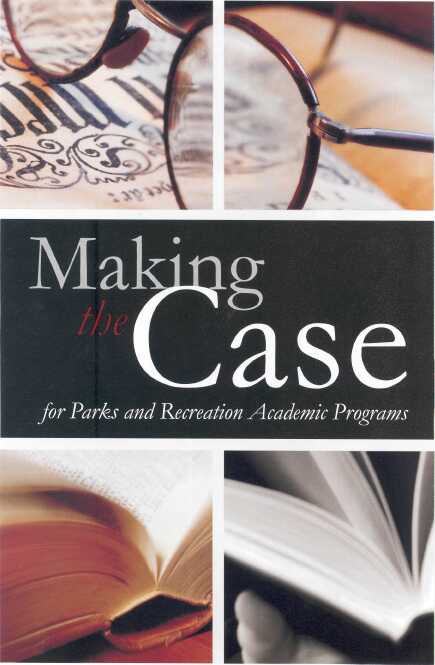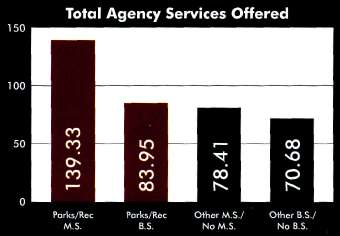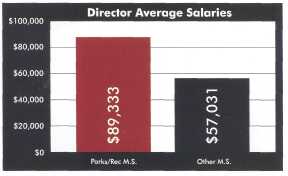 |
Home | Search | Browse | About IPO | Staff | Links |
 |
Home | Search | Browse | About IPO | Staff | Links |
 |
By David N. Emanuelson, Ph.D
Those of us who have worked in this field
Why a Specialized Parks and Recreation Curriculum is Essential
Some professionals have sought these skills through bachelors and masters
But that line of thinking fails to recognize that decades ago parks and recreation
A well designed parks and recreation curriculum is better at preparing our own professionals than the curricula of other fields. For example, most courses at the univeristy's college of business or MBA program are based on
the private sector, solely profit-driven model of doing business. While park and recreation professionals are in no way averse to profit taking, we must recognize that public parks and recreation management is a form of public administration. But it is a form of local government that doesn't command much individual attention from the political science department. True, public parks and recreation managers need to understand the political process in order to survive in the political arena. But they also need to understand that their services differ greatly from other municipal or local government services. The interest groups who pursue and demand parks and recreation services present a very different political dynamic from those who require water, sewer, police and fire services. |
May/June 2006 page 22 and 23
The Real World Advantages to Agencies
While we in academia have changed our culture and cross-fertilized with other fields to improve our body of knowledge, we're not sure that professionals and park boards are aware of how meaningful parks and recreation curricula have become. So we surveyed the academic backgrounds of the leaders of a number of park and recreation agencies in Illinois and also examined the level of services those agencies provided to their communities. There was strong evidence that agencies that employed administrators with degrees in the field provided higher levels of services than agencies administered by professionals who didn't have parks and recreation degrees.

|
As is shown in the chart above, in a sample of 100 parks and recreation directors in the state of Illinois, those administrators with masters degrees in parks and recreation supervised approximately 140 total programs and services within their agencies, while those with masters degrees in other fields or with no masters degree supervised approximately 63 total services. Disparity, albeit of less significance, also exists between the offerings of agencies led by those with bachelor's degrees in the field versus those with baccalaureate degrees in other fields and those with no degree. This finding ought to encourage park boards to seek people with masters degrees in the field.
|
The Real World Advantages to Professionals
Personal incentive for the pursuit of a masters degree can be found in the information portrayed in the following chart.
The graph illustrates the differences in average salaries of agency administrators
with masters degrees in the field compared to those
with masters degrees in other fields. A similar
dichotomy exists between administrators with baccalaureate degrees in the parks and recreation field and
those with degrees from other fields. Average salaries are $72,564 and $51,000 respectively.
The study also found that administrators with degrees in the field
have higher levels of satisfaction than those with degrees from other fields. One would expect that this higher satisfaction level is due to the fact that they have higher salaries than their counterparts without parks and recreation degrees. But regression analysis shows that the money is not a significant part of the explanation. We hypothesize that better preparation may be a contributing factor. | 
|
Because this is social science research, we can only assert these findings at a high statistical significance level rather than as definitive causal factors. But there continues to be emerging evidence that, for whatever reason, parks and recreation administrators who pursue training in the parks and recreation field seem to provide greater benefits to their agencies and themselves.
Groucho Marx once said that "I would never be a member of a club that would have me as a member." While his characterization is still reflective of many of our professionals and boards who fail to see the significance of earning a
specialized parks and recreation degree, it seems that changing this attitude would be in the best interest of individuals and agencies alike.
Parks and recreation administrators have a prime opportunity to encourage future practitioners when working with their seasonal and full-time staff. Many of these employees simply need to be made aware of the potential career opportunities in the field. Here are some methods for promotion of parks and recreation academic preparation through parks and recreation agencies:
• During orientation or staff training sessions, provide employees with information about higher education degree programs in the parks and recreation field.
May/June 2006 page 24
• Provide brochures and other tools such as DVDs and Web sites that delineate information about available undergraduate and graduate academic opportunities.
• Invite faculty representatives from university programs to speak to seasonal and other employees at staff or in-service meetings.
• Speak at middle and high school career days and contact high school counselors to make them aware of the opportunities in our field.
• Fund seasonal employees to attend conferences, workshops and seminars sponsored by universities, the IAPD and the IPRA.
We in academics applaud those professionals who have done some or all of these things. And we encourage those who have not promoted higher education in the parks and recreation field to considering doing so. We urge those who are reluctant to be prouder of the field, not because it would be better for any one university, but because it would be better for the profession.
Of course, it is always commendable when practitioners pursue continuing education and lifelong learning. However, it seems that a pervading thought pattern has emerged in our field that a master of business administration or master of public administration is a better substitute for a masters degree in parks and recreation administration. The findings of our study demonstrate that this thought pattern is erroneous. We hope that this study — and others to follow — will encourage administrators to have a new respect for their own field.
Dr. David N. Emanuelson is an assistant professor of recreation administration and the graduate internship coordinator at the George Williams College of Aurora University. He holds a bachelors degree in parks and recreation from the University of Illinois, an MBA from Indiana University, an MPA and Ph.D. in political science from Northern Illinois University. He has 30 years administrative experience as a parks and recreation department and park district director.
Dr. Sarah E. Hardin is an assistant professor of recreation administration at the George Williams College of Aurora University. A two-time graduate of the University of Illinois at Urbana-Champaign with a Ph.D. from Florida State University, her professional experience includes 15 years in campus recreation administration.
www.ILparks.org May/June 2006 25
|
|